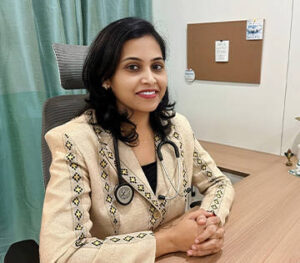Endometriosis
Endometriosis is a gynaecological condition wherein the cells that are similar to the lining of the uterus, or endometrium, grow outside the uterus.
Some of the possible causes of endometriosis are:
- Retrograde Menstruation: The most widely accepted cause, suggests that during menstruation, menstrual blood containing endometrial cells flows backward through the fallopian tubes into the pelvic cavity. These cells then implant and grow on pelvic organs and tissues.

Endometriosis
- Transformation of Peritoneal Cells: Hormones or some immune factors could cause the peritoneal cells, the cells lining the inner abdomen, to transform into endometrial-like cells.
- Hormonal Imbalances: Prolonged exposure to estrogen, primarily due to hormonal imbalances or conditions like early menarche (first menstrual period) or late menopause, may stimulate the growth of endometrial-like tissue.
- Genetic Factors: There is a higher risk of developing endometriosis in the event of a family history of the condition, indicating a genetic predisposition.
- Surgical Implantation: Endometrial cells may be transferred to a surgical incision during operations like C-sections or hysterectomies, where they can implant and grow.
- Immune System Dysfunction: At times immune system may not be unable to detect and eliminate endometrial-like tissue growing outside the uterus, allowing it to develop into endometriosis.
Some common Symptoms of endometriosis are:
- Painful periods (dysmenorrhea): Intense pain in comparison to typical menstrual cramps.
- Chronic pelvic pain: Occurrence of Pain during or between periods that is accompanied by lower back or abdominal pain.
- Painful sex: Pain during or after intercourse.
- Pain with urination or bowel movements: This is generally observed when the endometrial-like tissue is found on the bowel or bladder.
- Infertility: Endometriosis makes it more difficult to get pregnant.
- Heavy bleeding or spotting: Some women experience heavy menstrual bleeding (menorrhagia) or spotting, which light bleeding between periods.
- Fatigue: Experiencing extreme tiredness could be an indication of Endometriosis.
- Digestive issues: Some symptoms could include bloating, diarrhoea, or constipation, especially during menstruation.
However there could also be cases where there are no symptoms.
Meet Our Doctor
Our Consultant

Dr. Shivani Chandan L
Accomplished Gynaecologist and Laparoscopic Surgeon
